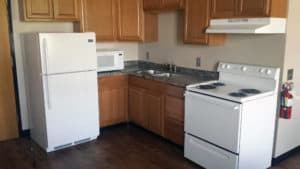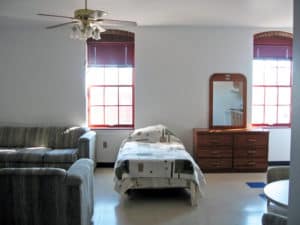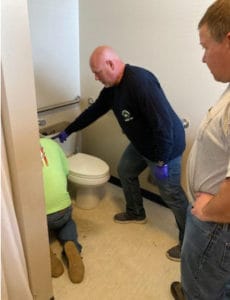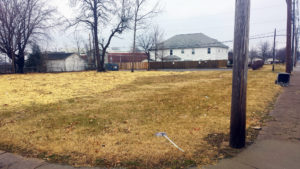United Caring Services Takes On Homelessness through Permanent Housing Programs

United Caring Services in Evansville, Ill., is well known for many of its shelter programs: a day shelter; men’s night shelter and women’s night shelter; recuperative care program providing a place for homeless individuals to stay after discharge for a hospital; and “white flag” program, providing seasonal night shelter to men, women and children during times of extreme heat or cold. These programs offer daily comfort and care to countless persons experiencing homelessness. But UCS — as part of fulfilling its mission statement — also helps provide access to stable housing opportunities that end people’s homelessness.
UCS manages two floors of apartments — the third and fourth floors — in its main building. The floors include a total of 21 apartments. Rent is approximately $550 a month, and includes all utilities. Jason Emmerson, executive director, says that almost a half dozen area agencies work with UCS to support their tenants through case management, referrals, and providing housing vouchers — like permanent supportive housing — to the people who qualify. Occasionally, UCS staff will identify a likely apartment candidate in one of the shelters and invite them to apply.

Emmerson says that UCS took the leap into affordable housing to do what it could to stem the tide of homelessness. “Food addresses hunger. Housing solves homelessness,” he said. “You can’t ‘meal’ your way out of homelessness, and you can’t ‘lotion’ your way out of homelessness. That stuff is important to people’s dignity, but housing ends homelessness, so why not eliminate 21 people’s homelessness? And so we did.”
The UCS apartments are a success story with meager, humble beginnings. Originally conceived of in 2003 as HUD transitional housing for men, with funding also from the Evansville Housing Authority (EHA), the program had potential, but was only partially successful, like most transitional housing programs. While it would help homeless men have an independent, stable, warm place to live, they were still categorized as homeless but not “category one,” said Emmerson, which limited the additional support they could receive. Additionally, the program length was temporary — HUD regulations capped residency at two years, meaning many of the clients ended up back on the streets after 24 months. Around the time Emmerson arrived at UCS in 2015, HUD had eliminated the transitional housing program because it wasn’t effective enough in preventing homelessness. At the time, only 10 of the units at UCS were occupied, leaving the others “opportunities-in-waiting,” Emmerson said.

Emmerson and the team at UCS began work to transform the units into permanent housing for people experiencing homelessness. In 2017, the 10 remaining tenants were switched to a lease and staff helped make certain they were comfortably housed and understood their new (and better) status as being “home.” UCS opened the apartments to both men and women. By the end of 2017, all 21 units were filled.
Today, of the original 10 tenants from 2016, about half are still apartment residents, and all 21 units remain regularly filled. UCS provides regular maintenance, and the units come equipped with a refrigerator, stove and microwave. Recently, for example, UCS instituted an upgrade plan for all of the toilets in the apartment units. A local grant funded the third floor, and at the time of this writing, Emmerson is close to soliciting enough funds to update the fourth floor.
Emmerson says that it’s the community partnerships, coupled with individual donations, that help keep the outreach and impact going. “It’s how we roll here,” Emmerson added. “We have at least a dozen agencies we partner with daily, our local and state government is very supportive, and local businesses understand the importance of homeless services.”

With the success of the apartments, UCS is looking to add more program options to its list of services and solutions. It is close to purchasing a nearby parsonage in mission partnership with a local UCC church, which UCS will develop into its first shared housing location. Further down the road is the development of property near its women’s shelter that UCS purchased before the pandemic hit. UCS had worked with partners to develop a small community village of between six and eight affordable homes, each around 420 square feet, that are affordable, energy efficient — and maybe renewable — safe, and secure. The plans are moving slowly as UCS is focusing first on the shared housing program, and as the Evansville area recovers from the effects of the pandemic.
“We want to continue to move toward the restoration side of things, and we want to keep doing what we’re already doing, but keep striving to do it better — shelters, medical respite, diversion services,” says Emmerson. “We want to address those issues that cause homelessness. We do not have the capacity to be a builder of 50-unit buildings, and a couple of other local organizations already are doing that. We want to help fill gaps in the local continuum of care by developing new, smaller, and more flexible responses. That’s the positive future for UCS that we should pursue — it will help the people we serve, and it’s needed in the community.”
Join Our Mailing LIst
"*" indicates required fields
Follow on Facebook
Denise Buck to Succeed Campbell as IFM CEO - CHHSM
www.chhsm.org
As IFM Community Medicine (IFM) Founder and CEO David Campbell M.D. plans to retire mid-year, his successor, Denise Buck M.D., has started working full-time with IFM in St. Louis. Before assuming this...